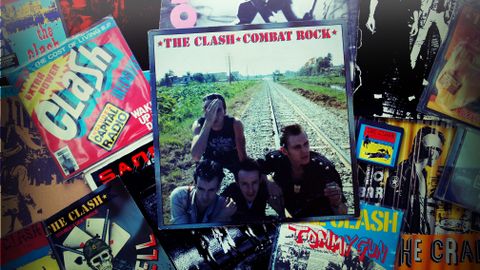It’s easy to damn Combat Rock with faint praise. It was intended as a double album but after the commercial failure of Sandinista!, CBS brought in Glyn Jones and the editing process began. Trimmed to 12 tracks and powered by two hit singles (Topper Headon’s Rock The Casbah – No.6 in the US – and Mick Jones’s Should I Stay Or Should I Go, top 20 in both US and UK), it became The Clash’s best-selling album.
So, yeah, it’s ‘the commercial album’ – the one for fair-weather fans. But as hit albums go, it’s pretty fucking weird. For starters it opens with ‘a public service announcement – with guitars’: Know Your Rights, a song without melody or a chorus, that suggests we only have three fundamental rights – and they’re all a bag of shit too. (How did that sentiment go down in Titfuck, Texas?) Elsewhere, Red Angel Dragnet lets tone-deaf bassist Paul Simonon loose on vocals for a demented Taxi-Driver-inspired punk funk patience-tester while Allen Ginsberg intones random bollocks/garbled poetry over Ghetto Defendant.
When it comes to crowd-pleasing commerciality, it’s fair to say that Combat Rock is not exactly Bat Out Of Hell.
Even at its straightest – on Car Jamming, Inoculated City and Atom Tan – the band sound like they’re dicking around. And while each of those songs could be described as whimsical and throwaway, the sheer fun they’re having is infectious. And then there’s the hits. Should I Stay Or Should I Go? commits several punk rock crimes:
i) It was a hit.
ii) It really is The Clash finally turning into the Stones, just like all their critics said they would.
iii) It’s a love/heartbreak song. You know: one of those songs they said they’d never write.
iv) It fits seamlessly on both dad rock compilations and classic rock radio station playlists.
All true, of course, but still: Should I Stay…? isn’t quite the cliched Bryan Adams, rock-lite its critics claim it is. Mick’s thinly-veiled resignation letter is the Stones-go-rockabilly (with a stop-start riff that maybe owes something to Sophistication by Sharks) and is enlivened considerably by Strummer’s nonsensical Spanish backing vocals.
And then there’s Rock The Casbah – Topper’s virtuoso moment – a genuine dance-floor filler that took into the US top ten but, 30-odd years later, is as ubiquitous as Come On Eileen or Tainted Love: one of a unique group of 80s anthems that loom so large they MUST be played at every 50th birthday party and second wedding reception.
Meanwhile the connoisseurs wallow in Sean Flynn, an eerie tropical jazz-dub track about Errol Flynn’s son (a celebrated war photographer who went missing in Vietnam) that would’ve fitted perfectly on Sandinista!, and the undisputed highlight, Straight To Hell, a lyrical tour de force – a hymn to the plight of immigrants everywhere – set to an elegiac throb and a rhythm that’s “basically bossa nova,” according to Headon. Tender, compassionate, surreal, playful, there is no other song quite like it.
Combat Rock is all the evidence you need to see why The Clash could never have had the success of U2 or The Police. They were just too damn contrary.
Fly On The Wall: Joe Strummer Runs Paris Marathon
Glyn Johns: My top 6 productions
The Clash Albums Ranked From Worst To Best – The Ultimate Guide


